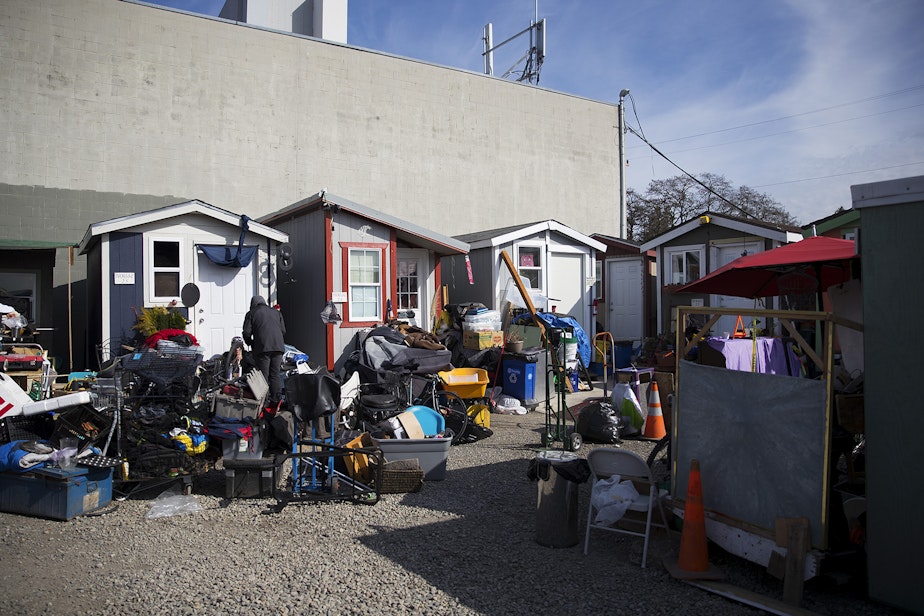New plan for tackling homelessness has big goals and a huge price tag

“Collective action is the path to solving complex problems, and this plan is the embodiment of our region’s decision to dramatically reduce homelessness.” That’s how the King County Regional Homelessness Authority begins its new five-year draft plan.
That proposal was announced last month and is currently receiving community feedback.
Seattle Times reporter Greg Kim says the proposal has raised eyebrows because of its major budget increase -- up to $8 billion in capital costs, plus $3.5 billion for operations.
"That would go towards building over 18,000 new temporary housing spaces," Kim says. "And for a little perspective, the county has a little more than 4,000 currently. So that's over a five-fold increase they're talking about."
Kim says the King County Regional Homelessness Authority, or KCRHA, isn't expecting the cities in King County to fully fund the plan. Right now, the Homelessness Authority has about $270 million in operating costs budgeted for 2023. That's primarily coming from the city of Seattle and King County.
The group is hoping for federal funding to help bridge the gap.
But Kim says there's more to this proposal than just sticker shock.
Sponsored
"The King County Regional homeless authority is not just proposing a radical scale up of the homelessness system, they're proposing a composition change," he says. That change would involve moving away from basic congregate shelters, and instead focusing on shelters that meet the needs of specific groups, such as those with severe mental illness, or people recovering from addiction.
"So, in total, our system has probably less than 5% of our temporary housing capacity for those categories," Kim says. "And one thing that the authority is proposing is changing that number to be more like 50%."
This is a transition the county is already making — it started during the pandemic, when motels were purchased as an alternative to congregate shelters so that people could remain isolated. People began accepting shelter at much higher rates, in part because congregate shelters can be violent, or a space where people get sick, Kim says.
Kim says no current congregate shelters would close under the new plan -- they'll just be shifting away from them as a strategy. The Homelessness Authority also hopes to spread out where services are located across the county, instead of being concentrated in Seattle.
Daniel Malone, executive director of the Downtown Emergency Services Center, says the need is acute.
Sponsored
"It's really hard right now, " Malone says. "It's always been hard. But some things have really dialed up in intensity in recent years."
The Downtown Emergency Services Center provides outreach, emergency shelters, and supportive housing.
Malone says a lot of the services people rely on stopped during the pandemic — from informal supports like open Starbucks cafes where people can sit inside, to formalized ones, like psychiatric hospitalizations.
"So they remain in the community in these very precarious situations," Malone says. "And that makes things worse, and everyone around experiences more of the crisis that the person's going through."
Malone understands the early skepticism the authority's proposal has encountered because of its large price tag — more than Gov. Jay Inslee plans to spend on homelessness for the entire state of Washington.
Sponsored
"I don't know if it's going to be politically feasible to do this," he says. "And then the question becomes, well, is it politically smart to even state a goal that isn't feasible to achieve?"
But Malone says that people need to understand the resources that are necessary to address this crisis. He says the county needs to be transparent about what it would cost, and this proposal does that.
But not everyone’s a fan of the agency’s draft plan.
"What the plan misses are some very sensible, cost effective and low-cost solutions to bring people indoors," explains Sharon Lee, executive director of the Low Income Housing Institute (LIHI). Among other services, LIHI operates 17 tiny house villages from Olympia to Bellingham.
KCRHA's five-year draft plan doesn't increase the funding for tiny house villages, also known as micro-modular shelters.
Sponsored
Lee says that's essentially the same as cutting funding, in a budget this big.
And she argues, by doing so, KCRHA is making a big mistake.
"Tiny houses have been shown to be the most cost effective and quickest way to set up shelter," Lee says. "The plan really ignores some lower costs, more effective solutions."
Lee notes that Seattle was the first city to attempt multiple tiny home villages. She says the Homelessness Authority is using faulty data when it comes to determining what projects successfully lead to permanent housing. She sees the group's big-ticket proposal as a direct attack on the policies and services that her group provides.
"And if you talk to any of the outreach to workers, you will find that people repeatedly ask for a tiny house if they're going to be swept," Lee says.
Sponsored
Lee says that the institute will continue to open more villages.
"While we have room to improve, like any program, we do want to run the best program possible," she says.
KUOW reached out to the King County Regional Homelessness Authority for an interview with CEO Marc Dones.
They declined, but the agency sent along this statement responding to Lee's critiques:
It's important to stay focused on the bigger picture--the work of ending homelessness is the work of people helping people.
"The solutions to homelessness are not one-size-fits-all, and the purpose of the state modeling methodology is to guide our community to right-size the system across all shelter types, including safe parking for cars and RVs, recovery housing, medical recuperation, micro-modular shelters like tiny houses, and non-congregate shelter or emergency housing like hotel/motel that can be converted to permanent housing.
The Homelessness Authority is currently accepting public comments on the proposed plan through Wednesday, Feb. 8. You can leave a comment for KCRHA at this link.





